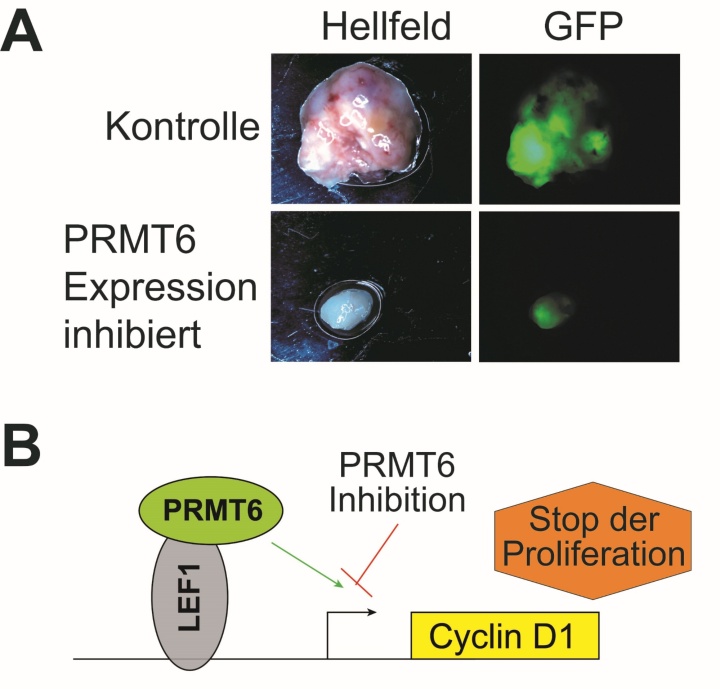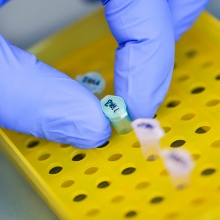New therapeutic approaches for treating leukemia are urgently sought worldwide. A team led by Prof. Dr. Jörn Lausen from the Department of Eukaryote Genetics at the Institute of Industrial Genetics at the University of Stuttgart and the German Red Cross Blood Donor Service Frankfurt has discovered a new link between cancer genes and cell growth regulation in a research project funded by the Wilhelm Sander Foundation. The results were recently published in the renowned journal Oncogenesis.
Leukemias are life-threatening cancers of the hematopoietic system. Despite advances in treatment, they are still among the deadliest diseases and are a pressing health concern, particularly in an aging society. One in 77 people in industrialized nations will develop some form of blood cancer in their lifetime. Despite the great progress made in treatment, the five-year survival rate (depending on the type of leukemia) is only slightly above 50%. Research is therefore being conducted worldwide on new treatment approaches.
New insights into certain genes that play a role in the development of leukemia have led to increased research in recent decades. Thanks to global scientific efforts, genes that stimulate cancer cell growth have been identified. Researchers are now taking a closer look at the regulation of these cancer genes. Understanding how they can be switched on or off without affecting their genetic makeup would be a critical step towards new therapeutic options.
Epigenetic mechanisms are a particularly interesting starting point for this. Epigenetics is based on changes in chromosomes that affect the activity of single or multiple genes. However, in contrast to mutations, epigenetic mechanisms do not change the DNA sequence but rather the three-dimensional structure of the chromosomes (i.e., the chemical structure of the DNA bases and/or the packaging of the DNA). Epigenetic mechanisms are particularly interesting for the regulation of cancer genes because they are mediated by enzymes that can, in principle, be suppressed.
Central cell growth regulation occurs through regulating gene expression (the reading and transcription of genetic information) by transcription factors and their epigenetic cofactors. One such epigenetic regulator of gene expression is protein arginine methyltransferase 6 (PRMT6), which influences cellular differentiation and proliferation. The disruption of proliferation control is a major cellular alteration in leukemias.

In a project funded by the Wilhelm Sander Foundation with € 134,000, the team of scientists led by Prof. Dr. Jörn Lausen from the Department of Eukaryote Genetics of the Institute of Industrial Genetics at the University of Stuttgart has demonstrated that the transcription factor LEF1 helps recruit the epigenetic gene expression regulator PRMT6 to the central cell cycle regulator cyclin D1 (CCND1). The researchers found that inhibiting PRMT6 leads to an altered epigenetic environment of the CCND1 gene – and thus a reduction of CCND1 expression. This is accompanied by a reduced proliferation of the cells. Jörn Lausen and Lucas Schneider worked together with Prof. Halvard Bönig and Prof. Erhard Seifried from the Institute for Transfusion Medicine and Immunohematology at the University in Frankfurt and the German Red Cross Blood Donor Service Baden-Württemberg–Hessen as well as Prof. Thomas Oellerich and Dr. Björn Häupl from the University Hospital Frankfurt Department of Medicine 2
“We hope that the discovery of this mechanism and the research based on it can contribute to the development and use of specific PRMT6 inhibitors for cancer therapy and thus further reduce the mortality of leukemia patients,” explains Lausen.
About the Wilhelm Sander-Stiftung
The Wilhelm Sander Foundation sees itself as a partner of innovative cancer research. The purpose of the foundation is to promote medical research, particularly in projects in the fight against cancer. Since the foundation was established, over € 250 million has been paid out for research funding in Germany and Switzerland. This makes the Wilhelm Sander Foundation one of the most important private research foundations in Germany. It emerged from the estate of entrepreneur Wilhelm Sander, who passed away in 1973.
Expert Contact:
Prof. Dr. rer. nat. Jörn Lausen, University of Stuttgart, Institute of Industrial Genetics, Department of Eukaryote Genetics, Phone +49 (0) 711-685-66971; E-Mail
Origina Publication:
Schneider L, Herkt S, Wang L, Feld C, Wesely J, Kuvardina O N, Meyer A, Oellerich T, Häupl B, Seifried E, Bonig H, Lausen J. PRMT6 activates cyclin D1 expression in conjunction with the transcription factor LEF1. Oncogenesis. 2021 May 17;10(5):42.


